What is self-care and why is it important?
The act of self-care, which is the action of taking care of yourself to achieve better health and well-being, can help you deal with moments of uncertainty and frustration. With the ongoing Covid-19 pandemic and the financial instability and job loss that has come along with it, there is an ongoing threat to mental, physical, and emotional health that makes self-care more important than ever before.
“The pandemic has threatened the mental and physical well-being of each and every one of us. Stay-at-home orders and social distancing have increased isolation,” says Wayne Jonas, MD, family physician, expert on integrative health, and executive director of Samueli Integrative Health Programs, in Alexandria, Virginia. Dr. Jonas notes the instinct to manage stress through self-care is not only natural but healthy.
Shadi Vahdat, MD, internal medicine physician at LiveWell Integrative Medicine in Los Angeles, adds that the act of self-care goes beyond taking bath bombs (palm-sized circles that fizzle and dissipate in water) and other acts of self-indulgence. “When you make room in your life to relax and take time for calm and self-reflection, you can not only improve your sense of well-being but also lower your blood pressure, improve your digestion, and even boost your immune system.” In other words, the act of self-care benefits your overall health and wellness. (Be sure to check out these self-care products you’ll love for me-time.)
Get inspired to be kind to yourself with these self-care quotes from frontline workers to scholars.
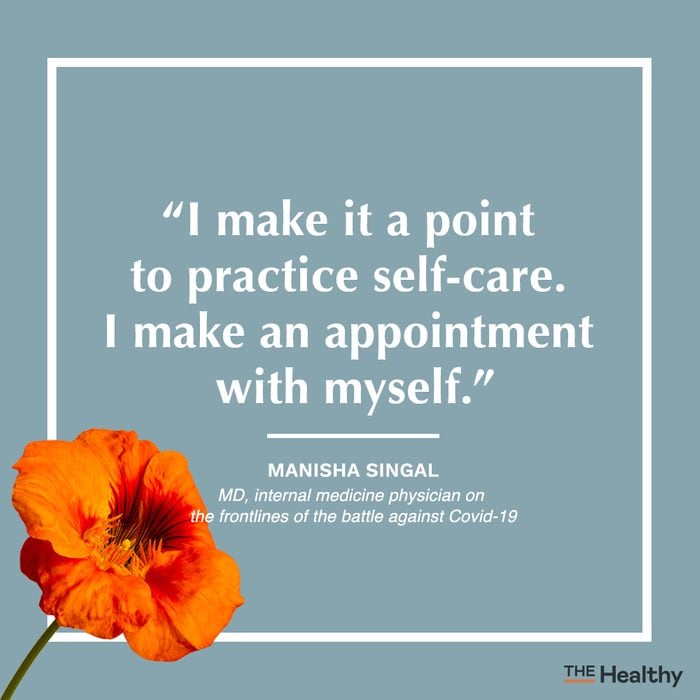
“I make it a point to practice self-care. I make an appointment with myself.” —Manisha Singal, MD, internal medicine physician on the frontlines of the battle against Covid-19
Self-care isn’t a new concept. Socrates was talking about its importance in the fifth century BC. The poet Rumi, taught his students its virtues in the 13th century. Political theorist, John Locke, wrote of it in the 17th century. And so on and so forth, right up through the current moment, in which doctors on the frontlines of the battle against Covid-19 speak openly about making self-care a priority.
Take, for example, Manisha Singal, MD, an internal medicine physician on the frontlines in Washington, D.C. “I make it a point to practice self-care,” says Dr. Singal. “In fact, I make an appointment with myself. I spend this time to meditate and affirm three things that I’m grateful for that day. The one quirky thing I do is sing along to Grease—and the lyrics which say, ‘We take the pressure, and we throw away. Conventionality belongs to yesterday…'”
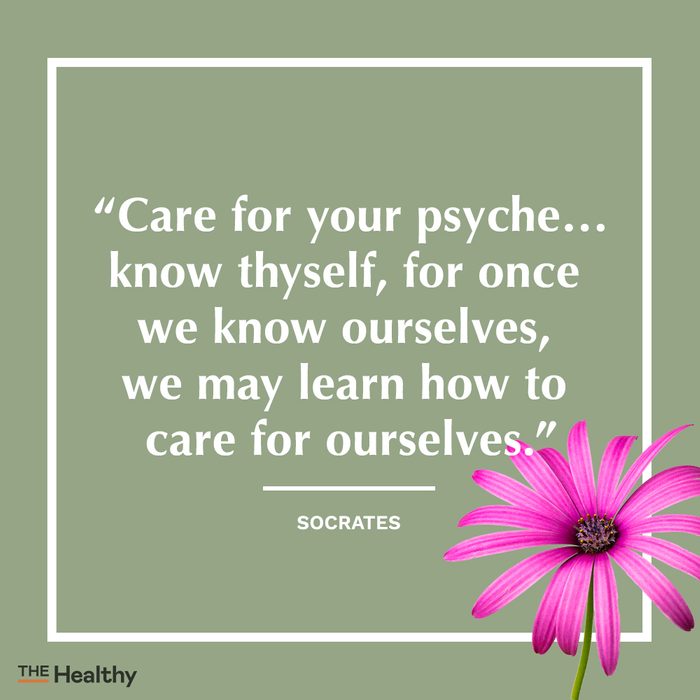
“Care for your psyche…know thyself, for once we know ourselves, we may learn how to care for ourselves.” —Socrates
When Socrates spoke of self-care, he was talking about self-reflection with a goal of self-improvement, with the larger goal of making the world a better place. Some cynics may call that “navel-gazing,” but in times like these, there’s no harm. (Here’s how to carve out more “me time.”)
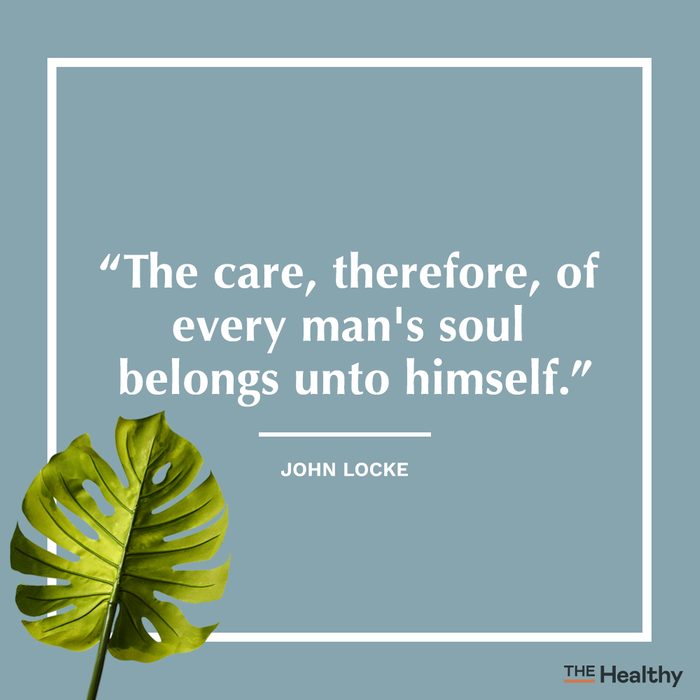
“The care, therefore, of every man’s soul belongs unto himself.” —John Locke
The English philosopher and political theorist, John Locke, whose lectures and writings laid the groundwork for the Age of Reason, the 18th-century movement founded on the notion that humanity could be improved through rational change, has been accused by some as endorsing what is thought of as hedonism, or the pursuit of pleasure. But like Socrates, Locke had the greater good in mind. “True happiness,” Locke thought, “is associated with the good,” and what is good leads to pleasure. In other words, a better world begins with each and every one of us taking better care of our own selves. Check out the best self-help books for women to get started.
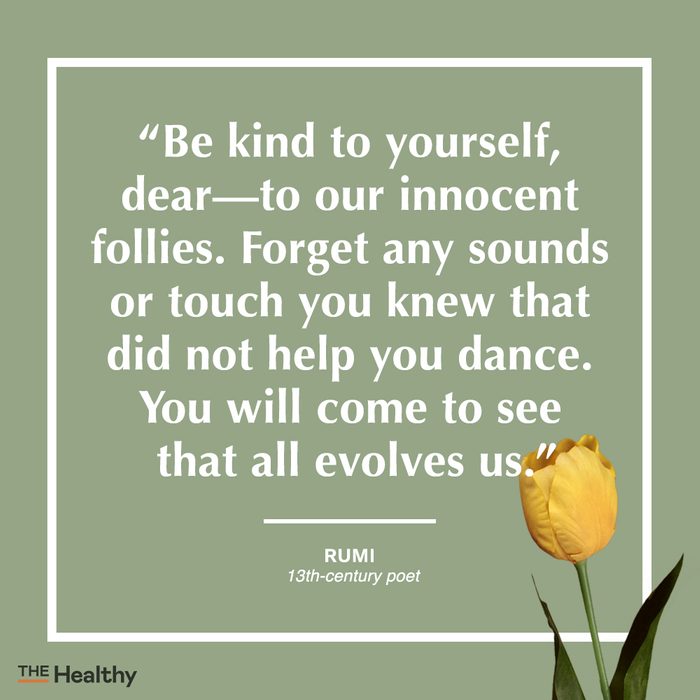
“Be kind to yourself, dear—to our innocent follies. Forget any sounds or touch you knew that did not help you dance. You will come to see that all evolves us.” —Rumi (13th-century poet)
Rumi was a Persian poet and Sufi master who lived during the 13th century. His teachings still resonate in the modern world and figure prominently in the teachings of many current spiritual guides, including Samora Suber, integrative coach and yoga teacher based in Los Angeles, who was inspired by this quote from Rumi to teach her students, “Trust the flow of your life. When you release the need to control and understand every single thing, you allow faith in all that is love to guide you. This is self-care.” (Adult coloring books are also a form of self-care.)
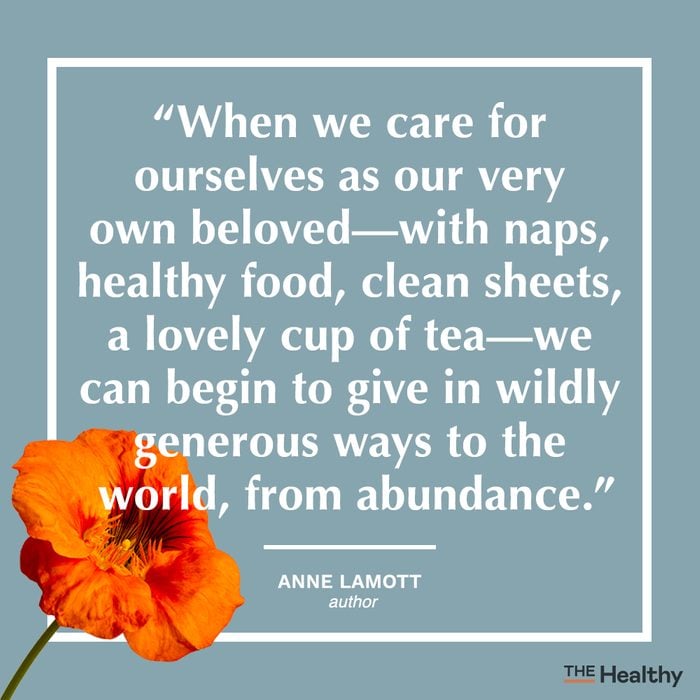
“When we care for ourselves as our very own beloved—with naps, healthy food, clean sheets, a lovely cup of tea—we can begin to give in wildly generous ways to the world, from abundance. —Anne Lamott, author
Taking care of yourself the way you would take care of those you love is what author, Anne Lamott, refers to as “radical self-care.” She maintains this is the secret to joy, resistance, and freedom. If this notion sounds familiar, perhaps it’s because she first spoke of it during a TED talk in 2017, “12 Things I Learned From Life and Writing,” which has been viewed nearly six million times.
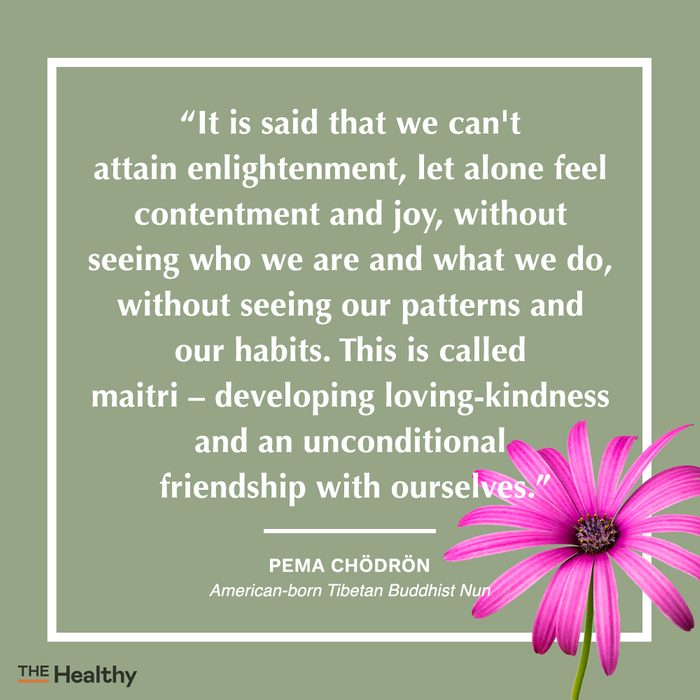
“It is said that we can’t attain enlightenment, let alone feel contentment and joy, without seeing who we are and what we do, without seeing our patterns and our habits. This is called maitri – developing loving-kindness and an unconditional friendship with ourselves.” —Pema Chödrön, American-born Tibetan Buddhist Nun
Pema Chödrön, a disciple of Tibetan Buddhist master, Chögyam Trungpa Rinpoche, is the author of several dozen books, including the beloved, best-selling When Things Fall Apart, from which this quote is taken. Chödrön often speaks of “maitri,” which Rinpoche defined as “unconditional friendliness with oneself.” Basically, it takes Socrates’ notion of taking time to examine and reflect on yourself and adds a healthy measure of tolerance for who you are. (Find out how astrology and mental health can help with self-care.)
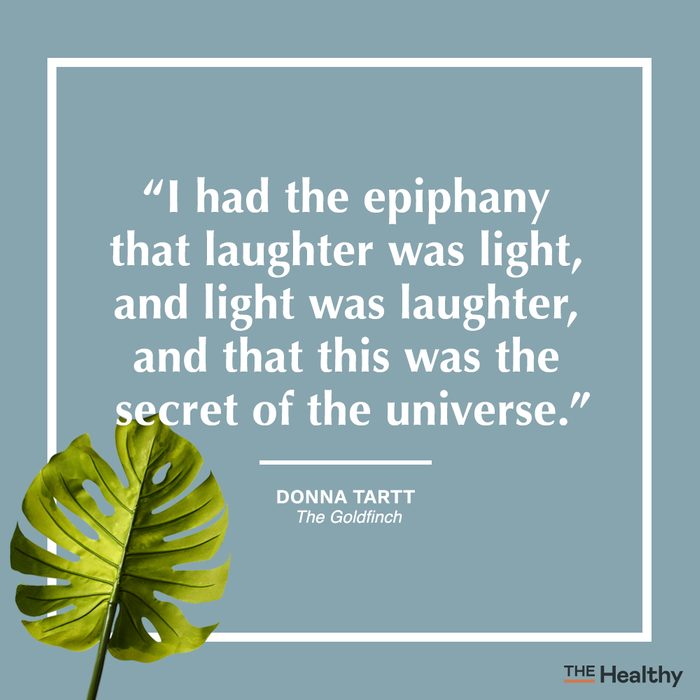
“I had the epiphany that laughter was light, and light was laughter, and that this was the secret of the universe.” —Donna Tartt, The Goldfinch
These words appear fairly early on in Donna Tartt’s epic Pulitzer Prize-winning The Goldfinch, but they resonate throughout the story, and throughout these difficult times as a reminder that laughter is a singular pleasure that has the same power as meditation, which is to say, it can transport you from wherever you are and whatever you are doing to a better place, if only for a moment. But that moment is everything.
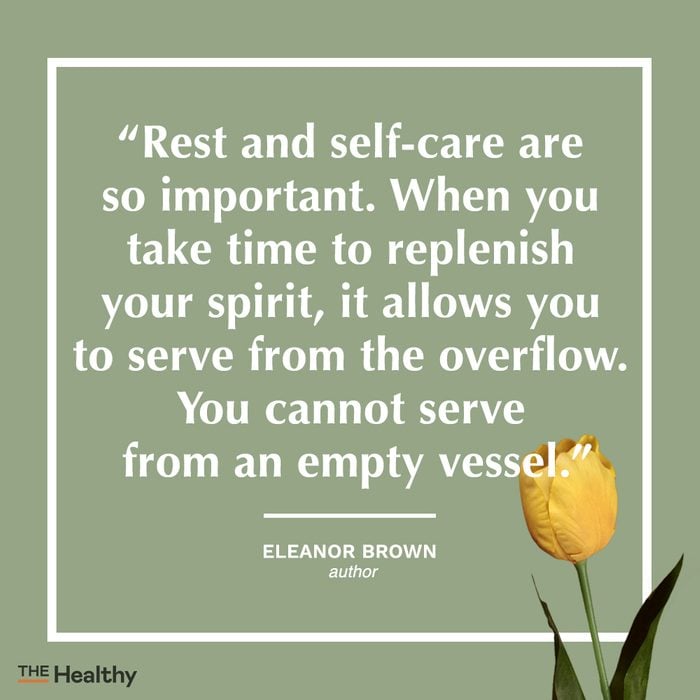
“Rest and self-care are so important. When you take time to replenish your spirit, it allows you to serve from the overflow. You cannot serve from an empty vessel.” —Eleanor Brown, author
“As a therapist who specializes in treating trauma, it is extremely important that I take care of myself so that I can continue to effectively serve those who are in need of help,” says Janika Joyner, licensed clinical social worker, owner of Higher Elevation Psychosocial Services in Chesapeake, Virginia, for whom this quote is a mantra. “Most helping professionals are genuinely concerned with the well-being of others and tend to focus on ensuring that everyone else is okay. I say that by taking care of myself and being replenished I am still showing concern for those that I serve.” (Learn how to make self-care a health priority through the dimensions of wellness.)
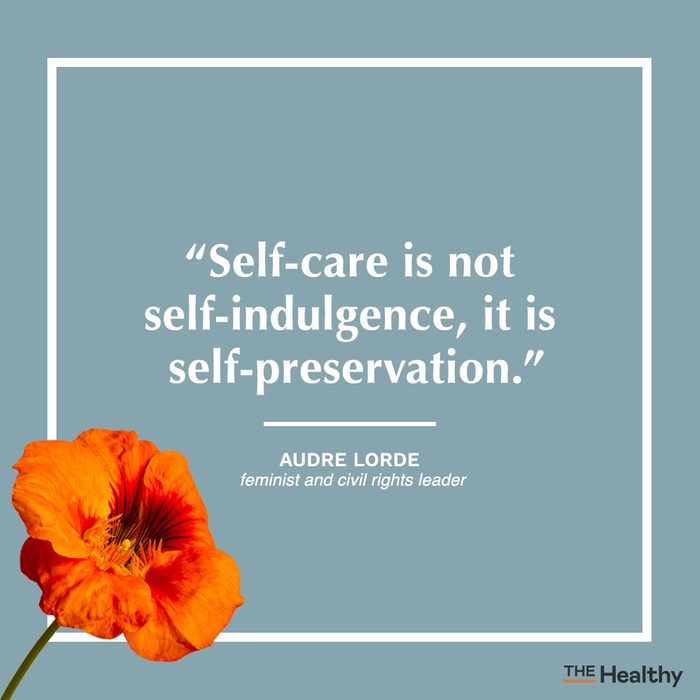
“Self-care is not self-indulgence, it is self-preservation.” —Audre Lorde, feminist and civil rights leader
“People, and women, in particular, tend to prioritize the needs of others over themselves and assume this is the best use of their time and energy. But my observation has been the opposite,” says Monique Derfuss, yoga instructor and gong practitioner who offers gong sound meditation to groups and individuals. “You can’t be there for others if you don’t first unapologetically take care of your own well-being,” says Derfuss, who’s also the president of Sound Wellness, which uses sound and music as a form of healing. (Here are the signs you need to take a mental health day.)
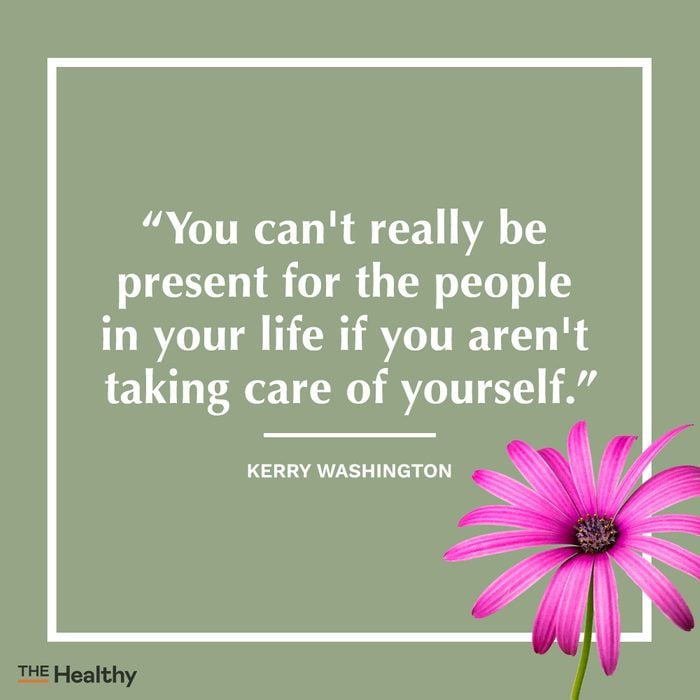
“You can’t really be present for the people in your life if you aren’t taking care of yourself.” —Kerry Washington
In an interview with Essence magazine’s chief content and creative officer, Moana Luu, Kerry Washington was lamenting that many Black women don’t have the luxury of self-care and pointing out that it’s not only unfair but counterproductive. Washington points to the example of the instructions given on airplanes regarding oxygen masks: you have to put your own on first, or what good will you be to those in your care? If you really want to be there for the people in your life who depend on you, you owe it to them and to you to take care of yourself. (Here are Black therapist tips for coping with racial trauma.)
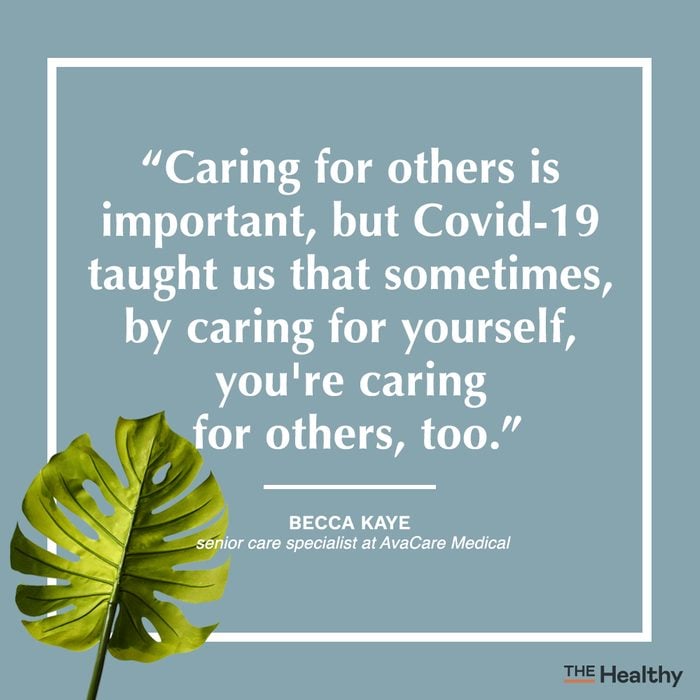
“Caring for others is important, but Covid-19 taught us that sometimes, by caring for yourself, you’re caring for others, too.” —Becca Kaye, senior care specialist at AvaCare Medical
“We all collectively underwent a trauma in recent months,” notes Becca Kaye, whose life’s work is about taking care of other people. “With the priority being survival, emotional health flew to the wayside. It has become imperative now that we focus on self-care. We’ve neglected it long enough. Now it’s time to relax our bodies, unwind our minds, and de-stress. Self-care is an integral part of the recuperation process.”
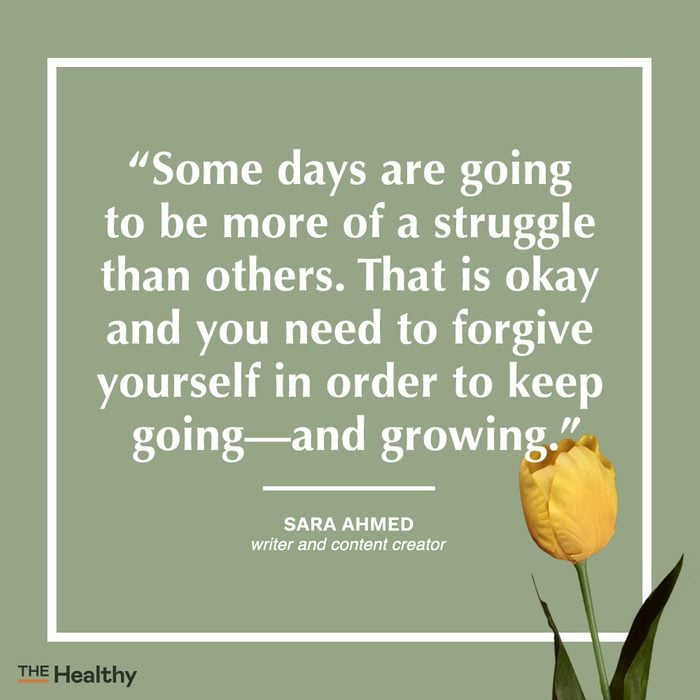
“Some days are going to be more of a struggle than others. That is okay and you need to forgive yourself in order to keep going—and growing.” —Sara Ahmed, writer and content creator
“Given the unprecedented situation we’re living through, there’s nothing more important right now than to be kind to ourselves,” says Sara Ahmed, a Muslim-American writer and content creator living in Texas. “Be generous with providing yourself and others around you with as much grace as you can muster.” (These are the health benefits of practicing generosity.)
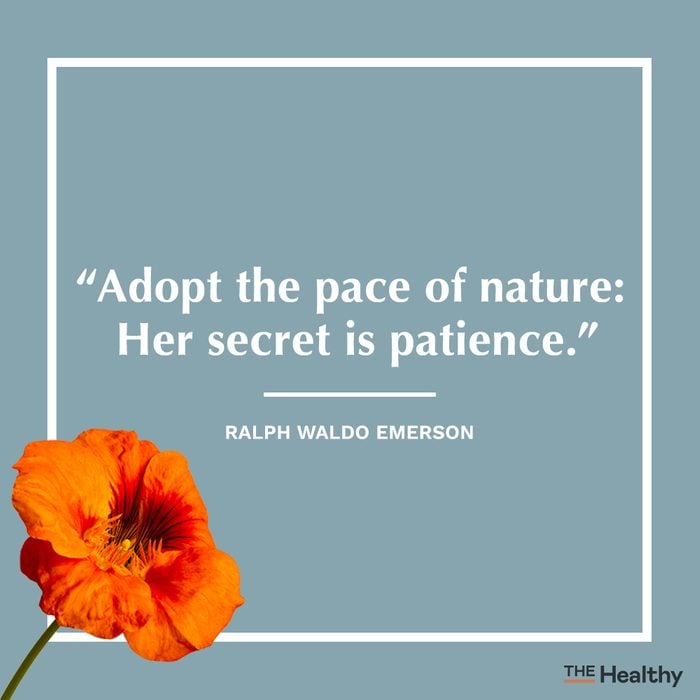
Adopt the pace of nature: Her secret is patience.” —Ralph Waldo Emerson
“Nature transitions from season to season without ever pushing or rushing things,” says Elena Mosaner, certified hypnotherapist, author, and professional coach, by way of explaining her read on the 19th-century writer and founder of the Transcendentalist Movement, Ralph Waldo Emerson. “Nature doesn’t overthink. Nature just happens. Trees shed leaves, flowers bloom, rivers flow. Your body is nature, and in the same way, you can and must trust it to heal through the power of presence and patience.”
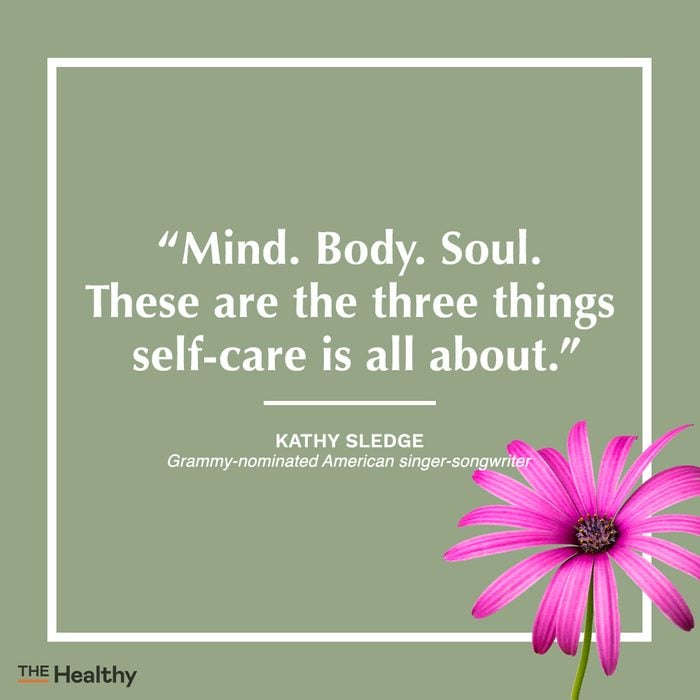
“Mind. Body. Soul. These are the three things self-care is all about.” —Kathy Sledge, Grammy-nominated American singer-songwriter (Sister Sledge)
Kathy Sledge was just a teenage girl when she and her three older sisters—performing as Sister Sledge, recorded “We Are Family” in 1979. Today, she’s a wife and mom of two and still writing, performing, and producing. Her timeless vocal on “Thinking of You” is also now DJ D-Nice’s official theme to “Club Quarantine,” and she hosts a talk show with daughter, Kristen Gabrielle. It’s a lot to balance, especially right now in the midst of the pandemic.
How does the health buff keep it all in balance? “Self-care is so important especially during this time,” she says. “For me, it’s always Mind. Body. Soul.” by which she means setting goals but pacing herself, sticking to healthy foods 80 percent of the time, and keeping a “merry heart” through meditation and prayer. Also, as she says, “smiling keeps you youthful,” but even when you can’t find it in yourself to raise those cheekbones, remember, “this too shall pass.”
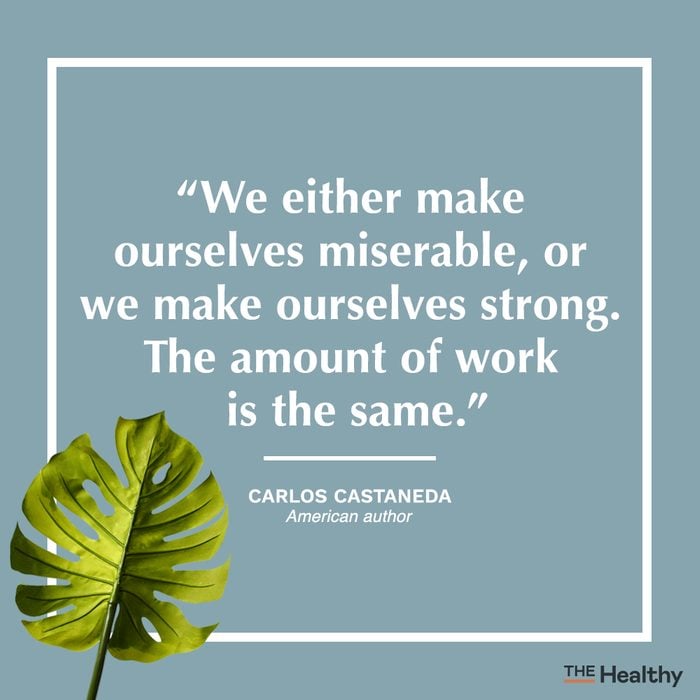
“We either make ourselves miserable, or we make ourselves strong. The amount of work is the same.” —Carlos Castaneda, American author
“Happiness is a choice,” observes psychotherapist Jennifer Tomko, owner of Clarity Health Solutions in Jupiter, Florida, which is why these wise words of Carlos Castaneda resonate with her. Self-care isn’t only about taking time for yourself. It’s also about choosing to look at things positively, even when that takes effort. You can assume the best or the worst of other people, but “assuming the best is an investment in my own well-being,” Tomko adds. (This is what optimistic people do every day.)
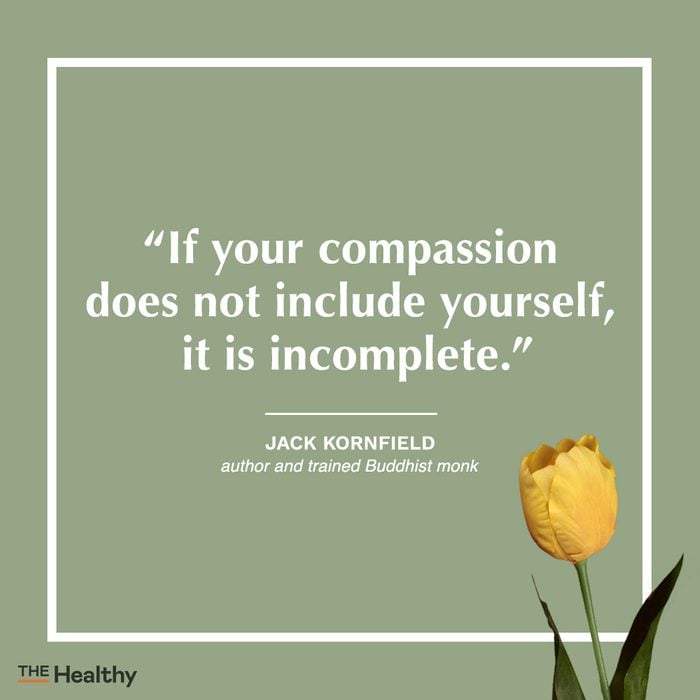
“If your compassion does not include yourself, it is incomplete.” —Jack Kornfield, author and trained Buddhist monk
This quote is sometimes attributed to Buddha, himself, but best-selling author, Jack Kornfield definitely said it in his book, Buddha’s Little Instruction Book. Like Chödrön, Kornfield is an American who sought training in traditional Tibetan Buddhism. And like Chödrön, his philosophy takes into account that taking the time to treat oneself with kindness and compassion is not innate, at least not to those who haven’t studied Tibetan Buddhism. Although extending that sort of latitude to yourself may take some effort, it’s worth the effort, as is all self-care. (Next, read the most influential self-help books of all time.)
